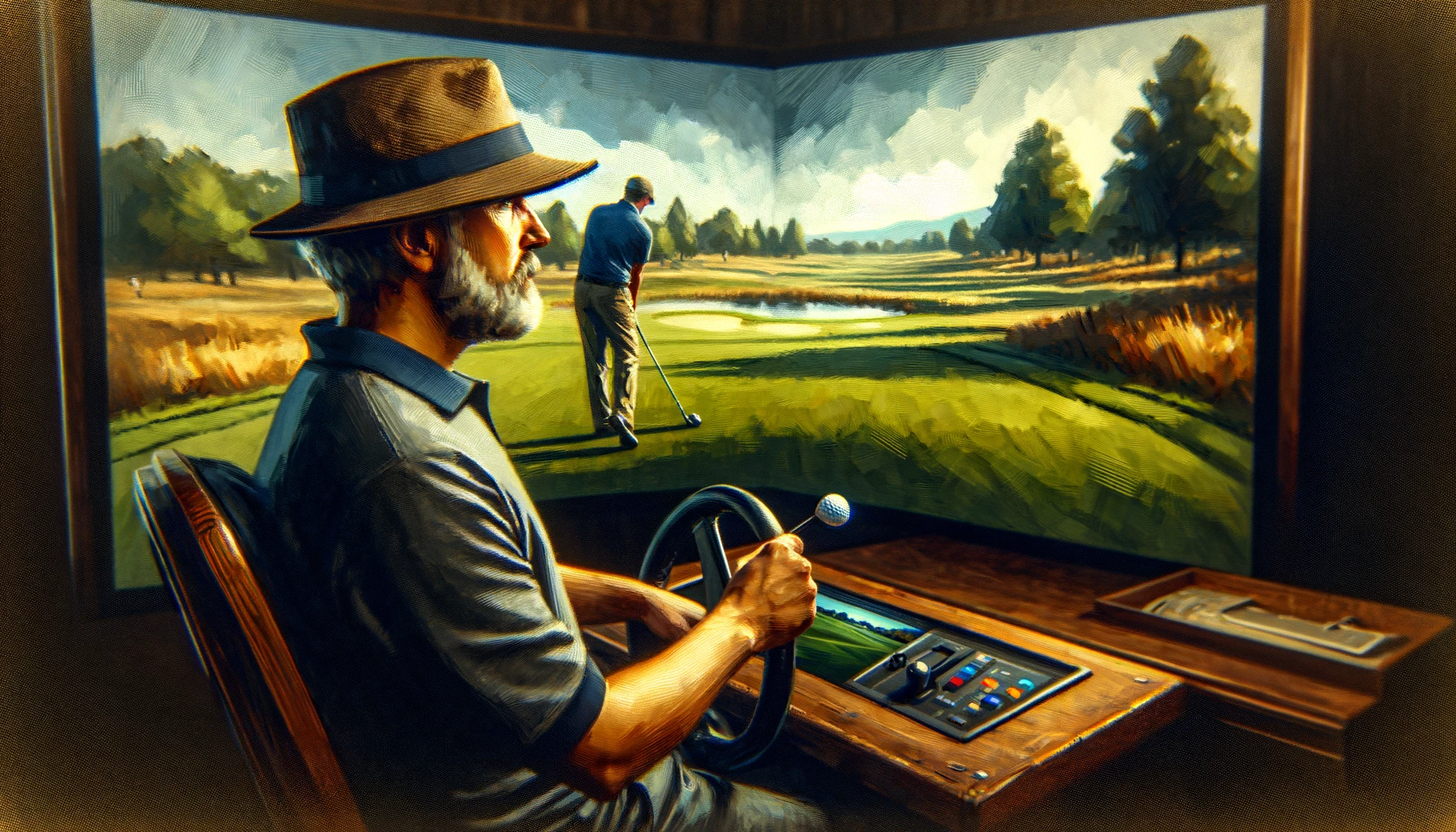- Home
- Golf Simulators
- How Accurate Are Golf Simulators
Myth-Busting Common Beliefs: How Accurate Are Golf Simulators Really?
Are you constantly questioning the effectiveness of your golf simulator sessions? How accurate are golf simulators really? As a weekend golfer passionate about improving your game, delve into this comprehensive guide. We uncover the truth behind simulator technology, compare virtual play to real-world experiences, and offer practical tips for maximizing your practice. Whether you're looking for quick insights or in-depth analysis, this article has got you covered with key takeaways and a helpful FAQ section.
As a weekend golfer, just like you, I've often pondered the effectiveness of golf simulators. The nagging question remains: "Are these simulators accurately reflecting our real game?" This is vital, as we're not just looking for entertainment, but actual game improvement.
Like you, I've hit what felt like perfect drives in the simulator, only to see a different outcome on the real course. It's both frustrating and perplexing. Is the simulator at fault, or are our skills not translating as expected? This doubt can undermine the value of our practice sessions.
Therefore, I've thoroughly investigated golf simulators to provide clarity not just for me, but for fellow golfers seeking the truth. This article will examine the accuracy of golf simulators through technology, user experience, and opinions, comparing feedback to actual golf scenarios.
 A golfer's quest for accuracy: The virtual fairways experience.
A golfer's quest for accuracy: The virtual fairways experience.Understanding Golf Simulators: A Comprehensive Overview
As a fellow weekend golfer, the allure of golf simulators for practice and improvement is undeniable. But how accurate are they? Let's delve into this.
What Are Golf Simulators?
- Golf simulators are advanced systems replicating golfing experiences indoors using high-speed cameras, infrared sensors, and more.
My First Encounter
- Stepping into a simulator for the first time was a mix of skepticism and excitement. It was a surreal experience that mimicked the real game surprisingly well.
How Do They Work?
- Simulators analyze numerous data points like club speed, ball spin, and launch angle, offering detailed insights into every shot.
The Data Speaks
- The level of detail in the data provided by simulators is impressive, offering insights beyond just distance.
Accuracy vs. Reality
- From personal experience, simulators are remarkably close to real golfing, accurately mimicking the physics of the game.
Limitations
- However, they can't fully replicate elements like turf interaction, which differs from hitting off a mat compared to actual course grass.
A Game-Changer for Practice
- Simulators allow for practicing in any weather and at any time, offering a chance to play courses from around the world.
- Golf simulators have become essential in modern golf training, providing valuable feedback on ball flight and swing, despite some limitations.
The Science Behind the Simulation: How Golf Simulators Measure Accuracy
Delving into the technology and accuracy of golf simulators, we explore what makes them an essential tool for golfers.
The Heart of the Simulator: Technology at Play
- Golf simulators combine high-speed cameras and infrared sensors to track the minutiae of swings and ball flights.
Personal Experience: The Eye-Opening Moment
- Analyzing my swing in slow motion in a simulator revealed details like club path and ball spin, offering insights previously unnoticed on the course.
Data Analysis: More Than Just Distance and Direction
- Simulators provide comprehensive data including clubhead speed, ball spin, launch angle, and distances.
Accuracy: A Matter of Calibration
- High-end simulators are highly accurate, often mirroring real-world outcomes with impressive precision.
Comparing with Real-World Data
- Comparisons between simulator stats and real-course data show striking similarities, underscoring the simulator's accuracy.
Simulators and Teaching Pros
- Teaching professionals increasingly use simulators for their concrete, data-backed insights beneficial for golf instruction.
Limitations: They're Not Magic Mirrors
- Despite their accuracy, simulators can't replicate certain real-world conditions like wind resistance and turf interaction.
- Golf simulators, with their detailed data analysis, are invaluable tools for golfers looking to enhance their skills through accurate shot measurement and analysis.
 Testing the limits: How true-to-life are golf simulators?
Testing the limits: How true-to-life are golf simulators?Real Golf vs. Virtual Golf: Comparing On-Course Experience with Simulated Play
Exploring the differences and similarities between real golf experiences and playing on a simulator.
The Allure of the Real Course
- The real golf course offers an unmatched experience with its natural elements and atmosphere, something simulators can't fully emulate.
My Eye-Opening Round
- Experiencing a great round on the simulator followed by a challenging day on the actual course highlighted the differences in real-world conditions.
Simulator Strengths
- Simulators are excellent for practicing swing mechanics and specific shots, and they offer consistent playing conditions regardless of weather.
But Here’s the Catch
- Despite their benefits, simulators lack real-world elements like varying weather conditions, diverse terrains, and the psychological aspects of playing with competitors.
The Blend of Both Worlds
- A combination of simulator practice and real-world play is the best approach, utilizing each for their respective strengths.
Simulator Accuracy: Close, But Not Quite
- While simulators provide a close approximation for drives and long irons, they may not always accurately replicate the intricacies of the short game.
The Verdict
- Golf simulators are a valuable practice tool that should complement, not replace, playing on actual golf courses, offering a balance between convenience and real-world experience.
Maximizing Your Practice: Tips and Tricks for Getting the Most Out of Golf Simulators
As a golfer who's embraced both the real greens and virtual fairways, I've gathered some tips to maximize your practice with golf simulators.
Personal Insight: Finding the Sweet Spot
My journey with golf simulators taught me how to make the most of them. Initially, I was overwhelmed by the data, but soon, I learned to focus on key metrics that directly impacted my game.
Tips for Effective Simulator Practice
1. Focus on Specific Areas: Use the simulator to work on particular aspects of your game. Whether it's driving distance or iron accuracy, target your practice sessions.
2. Understand the Data: Learn what each metric means and how it relates to your swing. This understanding turns data into actionable insights.
3. Replicate Real Course Conditions: Try to mimic conditions you'd face on the course. Adjust settings in the simulator to simulate different weather and course layouts.
4. Use Feedback Constructively: Don't get disheartened by poor shots. Use the feedback to understand and improve your technique.
5. Integrate with On-Course Play: Combine simulator sessions with real-world play. This approach helps translate the improvements onto the actual course.
Maximizing Accuracy
To get the most accurate feedback:
- Ensure the simulator is well-calibrated.
- Use quality golf balls that you would use on the course.
- Regularly update the simulator's software for the latest enhancements.
The Game-Changing Session
I recall a session where I focused solely on my slice. The simulator's feedback helped me adjust my grip and stance, leading to noticeable improvements on the course.
A Balanced Approach
Remember, golf simulators are tools, not substitutes. They offer incredible insights and opportunities for improvement, but they work best when used in conjunction with real golf experiences.
Let's add this final piece to our comprehensive guide.
 Unveiling the truth: The striking accuracy of golf simulators.
Unveiling the truth: The striking accuracy of golf simulators.Key Takeaway: Embracing the Accuracy of Golf Simulators
As we wrap up this deep dive into golf simulators, here are some key takeaways:
1. High-Level Accuracy: Golf simulators offer an impressively accurate representation of your shots, especially for drives and long irons.
2. Data-Driven Improvement: They provide valuable data that can help fine-tune your game, focusing on specific areas like swing speed and ball trajectory.
3. Complementing Real-World Practice: While they can't replace the experience of playing on a real course, simulators are a fantastic tool for practice and improvement.
4. Community and Sharing: Engage with the Golfeaser community to share your simulator experiences and learn from others.
Take Action and Engage
- Share your golf simulator stories with the Golfeaser community. How has it impacted your game?
- Sign up for our newsletter to stay updated on the latest golfing tips and insights.
- Keep living by the Golfeaser Manifesto, embracing every round as a step towards mastery.
Final Thoughts
Are you ready to explore the world of golf simulators and see how they can elevate your game? Let us know your thoughts and experiences. How accurate do you find them compared to your on-course play? And remember, the journey to mastering golf is always evolving – on and off the course.
Join us at Golfeaser, share your stories, and let's continue this exciting golfing journey together.
FAQ: Understanding the Accuracy of Golf Simulators
How Accurate Are Golf Simulators?
How Accurate Are Golf Simulators?
Golf simulators are highly accurate in simulating real golf experiences, especially for measuring shot distance, launch angle, and ball speed. However, they might not fully replicate environmental factors like wind and terrain variations.
What Technology Do Golf Simulators Use to Measure Accuracy?
What Technology Do Golf Simulators Use to Measure Accuracy?
Golf simulators use a combination of high-speed cameras, infrared sensors, and sophisticated software algorithms to track and analyze every aspect of your swing and the ball's flight path.
Can Golf Simulators Improve My Real-World Golf Skills?
Can Golf Simulators Improve My Real-World Golf Skills?
Yes, golf simulators can significantly improve your real-world skills. They offer valuable feedback on your swing mechanics, helping you refine your technique. However, complementing simulator practice with actual on-course play is recommended.
Do Golf Simulators Accurately Simulate All Aspects of a Golf Course?
Do Golf Simulators Accurately Simulate All Aspects of a Golf Course?
While golf simulators accurately replicate many aspects of a golf course, including terrain and weather conditions, they cannot fully emulate the physical experience of playing on different types of grass and under varying weather conditions.
Are Golf Simulators a Good Investment for Serious Golfers?
Are Golf Simulators a Good Investment for Serious Golfers?
For serious golfers, simulators are a valuable investment. They provide detailed analytics on your game, allow for practice in all weather conditions, and offer the convenience of playing different courses virtually.
How Do I Choose the Right Golf Simulator for Accurate Feedback?
How Do I Choose the Right Golf Simulator for Accurate Feedback?
When choosing a golf simulator, consider factors like the technology it uses (e.g., camera-based or radar-based systems), its software capabilities, user reviews, and your specific training needs.
Can Golf Simulators Help with Understanding Course Management?
Can Golf Simulators Help with Understanding Course Management?
Golf simulators can aid in understanding course management by simulating various courses and conditions, allowing golfers to practice strategic decision-making without having to be on the actual course.











